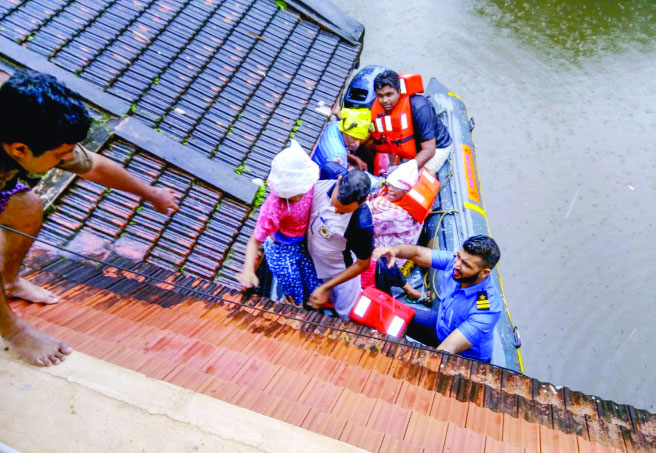Short-term gains at the expense of the environment cannot be allowed. Expert committee reports need to have sanctity and must be implemented properly
The recent floods in Kerala have had a staggering impact and inflicted loss of life and property, the scale of which, has been greater than any other natural disaster in recent times that Kerala has endured. More than 374 people have lost their lives while 12 lakh people have been rendered homeless and having to stay in relief camps across the State. The loss of property in monetary terms is close to an astounding 19,000 crores, and that too, within a span of 20 days, where the beleaguered State received the highest ever rainfall in the past 87 years.
However, over the past 24 hours, the weather situation in Kerala has been steadily improving, allowing the relief efforts to reach the population — some of whom have been stranded for days in remote locations without enough supplies to sustain. The scale of the disaster has prompted the immediate question: How did we not see this comingij And if we did, why was almost nothing done about itij
Although these questions are a bit too late in the day but same questions were raised during 2013 floods in Uttarakhand and apparently no lessons were learnt from that experience either. The Kerala floods are an example of how due diligence reports and forecasts by expert panels are cast aside without a second look. The gusto with which these panels and committees are created is commendable but the same enthusiasm is clearly missing when it comes to implementing these reports. As Kerala faced its worst floods in decades, author of a landmark report on the conservation of the Western Ghats, Madhav Gadgil, marked that “the scale of the disaster would have been smaller had the State Government and local authorities followed environmental laws.”
Madhav Gadgil, who headed the Western Ghats Ecology Expert Panel formed by the Ministry of Environment and Forests in 2010, further stated that at least a part of the problem in Kerala was “man-made”. The role of rampant development without environmental regulations overseeing the same had locked the State into an unrecoverable downward spin. Back in 2011, the Gadgil panel had suggested measures for preservation of the natural environment of the ecologically fragile Western Ghats region. The report had recommended that the entire Western Ghats, spread over six States, including Kerala, be declared ecologically sensitive and had assigned three levels of ecological sensitivity to regions within the Ghats. The committee had strongly recommended a ban on certain new industrial and mining activities in the area and called for a strict regulation of developmental works in consultation with local communities and gram panchayats.
The report met with stiff resistance from Governments of all six States. Thereafter, the Environment Ministry appointed another panel headed by space scientist K Kasturirangan to “examine” the Gadgil Committee report in a “holistic and multidisciplinary” fashion, while considering the objections raised by the State Governments and responses received from others. The Kasturirangan Committee, which submitted its report in 2013, severely watered down the recommendations of the Gadgil panel, effectively suggesting that only one-third of the Western Ghats should be identified as ecologically sensitive.
After protracted consultations with the State Governments, the Environment Ministry last year notified some 57,000 sq km of the Western Ghats as the ecologically sensitive area in which all mining activities, large constructions, thermal power plants and highly polluting industries were banned. Of the area that was finally notified, only 9,993.7 sq km was in Kerala, after the State Government objected to the 13,108 sq km that the Kasturirangan Committee had identified as ecologically sensitive in the State. By these collective actions, the State seemed to have sealed its own fate. The role of interest and pressure groups has unfortunately taken precedence over the environment.
The Government in the grip of vested interests is unable to get crucial environmental laws to be implemented, and as a result, the recommendations of the experts are falling on deaf ears. For instance, the Gadgil report highlighted illegal stone quarrying and construction as the most damaging activity in Kerala that was degrading the sensitive ecology day by day but still the Government was tight-lipped about the same. Are short-term interests of a few in power worth the long-term damage to the State, its people and the environmentij It is sad that a literate State like Kerala could not stop watering down of Madhav Gadgil report recommendations.
Kerala and its people now need to regard the current disaster as a warning as human intervention add to the magnitude of any natural disaster thereby effectively amplifying the damage to life and property. The cloudburst in 2013 in Uttarakhand is an apt example wherein massive landslides and flash floods killed close to 6,000 people. Rampant development and construction added to the misery of the disaster in the State. The same is occurring now in Kerala.
Massive encroachment and deforestation of catchment areas are causing irreversible damage and setting the State for bigger disasters.The Gadgil report had pointed out that many reservoirs in the Western Ghats States, especially those in the steep valleys, were silting up prematurely due to massive encroachment and deforestation of catchment areas. The Idukki dam is a classic case wherein the entire catchment was encroached along the dam construction belt, the report said.
Short-term gains in the hands of few at the expense of the environment and people of that State cannot be allowed. Expert committee reports need to have sanctity and must accordingly be implemented without fear or favour. This alone can prevent the repeat of the natural disasters that have active human role in them.
(The writer is an environmental journalist)


























